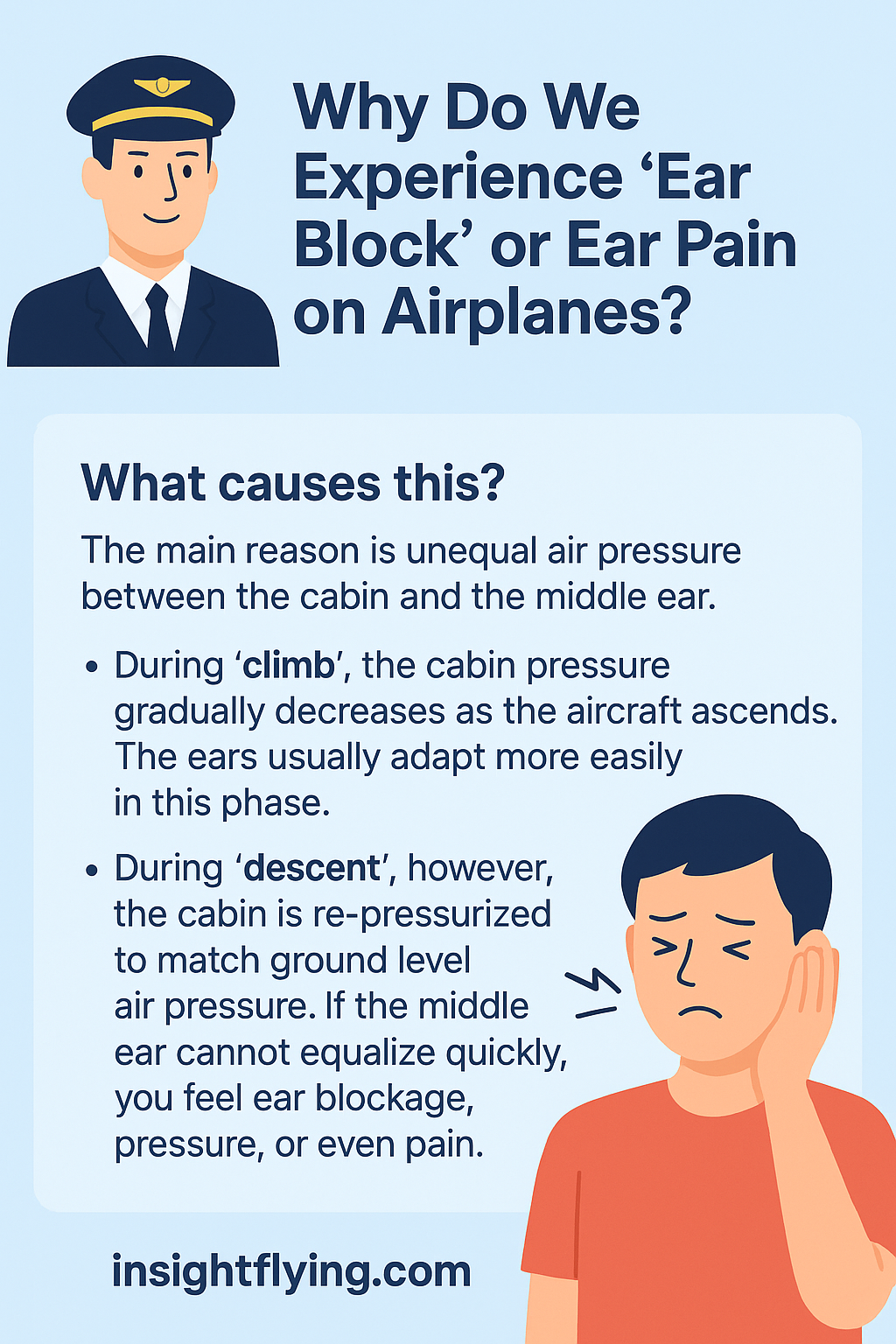เพื่อนท่านหนึ่งเล่าให้ฟังว่า เวลาขึ้นเครื่องบินจากดอนเมืองไปอุดรฯ ช่วงเครื่องขึ้นรู้สึกหูอื้ออยู่สักพักแล้วหาย แต่ระหว่างทางกลับมีอาการหูอื้อและบางครั้งปวดแก้วหู จนกระทั่งเครื่องลงก็ยังไม่หาย ต้องใช้เวลาหลายชั่วโมงหลังถึงบ้านอาการจึงดีขึ้น ทั้งที่ปกติเคยบินก็ไม่เคยมีอาการรุนแรงแบบนี้
เกิดจากอะไร?
อาการหูอื้อบนเครื่องบิน เกิดจาก ความดันอากาศระหว่างห้องโดยสารกับหูชั้นกลางไม่สมดุล
- ระหว่าง ไต่ระดับ ความกดอากาศในห้องโดยสารลดลง ทำให้หูค่อย ๆ ปรับตัวได้ง่ายกว่า
- แต่ช่วง ลดระดับเพื่อเตรียมลงจอด ห้องโดยสารถูกปรับความกดอากาศให้สูงขึ้น เพื่อใกล้เคียงกับความกดอากาศบนพื้นดิน ซึ่งร่างกายเราต้องปรับความดันในหูให้สมดุลด้วย หากหูชั้นกลางไม่สามารถปรับทัน จะรู้สึกหูอื้อหรือถึงขั้นปวดได้
กรณีที่เป็นรุนแรง เช่น ปวดมากหรือหูดับนาน ๆ อาจเรียกว่า Airplane Ear (Barotrauma) ซึ่งถ้าหนักอาจทำให้เยื่อแก้วหูบาดเจ็บหรือฉีกขาดได้
วิธีช่วยบรรเทาอาการ
- กลืนน้ำลาย / เคี้ยวหมากฝรั่ง / เคี้ยวปาก → กระตุ้นการเปิดท่อยูสเตเชียน (Eustachian Tube) ให้ความดันอากาศไหลเข้าออก
- Valsalva Maneuver → หายใจเข้าลึก ๆ ปิดจมูกและปาก แล้วพยายามเป่าลมออก จะได้ยินเสียง “ป๊อบ” ในหู แสดงว่าความดันเริ่มสมดุล อาจต้องทำหลายครั้ง
- อย่านอนหลับตอนเครื่องลดระดับ → เพราะร่างกายไม่ได้ปรับความดันเองทันที ทำให้หูอื้อได้ง่ายขึ้น
- เด็กเล็ก ควรให้ดูดนม กินน้ำ หรือไม่หลับตอนเครื่องลดระดับ เพราะเด็กทำ Valsalva ไม่ได้ การร้องไห้ของเด็กก็เป็นกลไกช่วยปรับความดันในหูเช่นกัน
เมื่อใดควรไปพบแพทย์
- ปวดหูมากผิดปกติ
- หูดับนานเกิน 24 ชั่วโมง
- มีน้ำหรือเลือดออกจากหู
กรณีนี้อาจมีการบาดเจ็บของเยื่อแก้วหู ควรรีบพบแพทย์หูคอจมูกทันที
ทำไมบางคนเป็น บางคนไม่เป็น?
ขึ้นอยู่กับสภาพร่างกายและสุขภาพขณะนั้น เช่น
- กำลังเป็นหวัด คัดจมูก ไซนัสอักเสบ → ท่อยูสเตเชียนบวม อากาศไหลเข้าออกยาก
- การพักผ่อนไม่เพียงพอ ภูมิคุ้มกันอ่อนลง
- ความแตกต่างของการตอบสนองระหว่างบุคคล
✈️ ในมุมของนักบิน ผมอยากให้ผู้โดยสารทุกท่านทราบว่า อาการหูอื้อบนเครื่องบินถือเป็นเรื่องปกติที่เกิดขึ้นได้ แต่ถ้าหนักผิดปกติ ควรใส่ใจและปรึกษาแพทย์ เพราะหูคืออวัยวะสำคัญที่เกี่ยวข้องกับการทรงตัวและการรับเสียง การดูแลให้พร้อมก่อนการเดินทาง จะช่วยให้การบินสบายและปลอดภัยยิ่งขึ้นครับ
Why Do We Experience “Ear Block” or Ear Pain on Airplanes?
A friend once asked me why, during a short flight from Don Mueang to Udon Thani, she felt her ears blocked shortly after takeoff, then the sensation disappeared. But halfway through the flight, her ears became blocked again, and sometimes painful. Even after landing, the discomfort lasted several hours before returning to normal. She wondered if it was something wrong with her own body, since other passengers didn’t experience the same problem.
What Causes This?
The main reason is unequal air pressure between the cabin and the middle ear.
- During climb, the cabin pressure gradually decreases as the aircraft ascends. The ears usually adapt more easily in this phase.
- During descent, however, the cabin is re-pressurized to match ground level air pressure. If the middle ear cannot equalize quickly, you feel ear blockage, pressure, or even pain.
In severe cases, this condition is known as Airplane Ear (Barotrauma). If untreated, it may even cause damage or rupture of the eardrum.
How to Relieve the Symptoms
- Swallowing, chewing gum, or simply moving your jaw → helps open the Eustachian tube, allowing air to flow and equalize.
- Valsalva Maneuver → Take a deep breath, close your mouth, pinch your nose, and try to blow gently. You should hear a “pop” in your ears, indicating that pressure is equalizing. Sometimes this needs to be repeated.
- Avoid sleeping during descent → When asleep, your body does not actively adjust pressure, making blockage more likely.
- For infants and children → Give them something to drink, suck, or chew during descent. Babies often cry during this phase; crying itself helps equalize ear pressure.
When to See a Doctor
- Severe or persistent ear pain
- Hearing loss that lasts more than 24 hours
- Fluid or blood coming from the ear
These could indicate middle ear injury and should be checked by an ENT doctor.
Why Some People Experience It and Others Don’t
It depends on individual health conditions:
- Having a cold, nasal congestion, or sinus infection makes equalizing harder.
- Swelling of the Eustachian tube reduces airflow.
- Fatigue or a weakened immune system may also make symptoms worse.
- Each person’s body adapts differently.
✈️ From a pilot’s perspective, ear blockage is quite common during air travel. But if it is unusually severe or painful, it should not be ignored. Taking care of your ears before and during flights will help make your journey safer and more comfortable.

